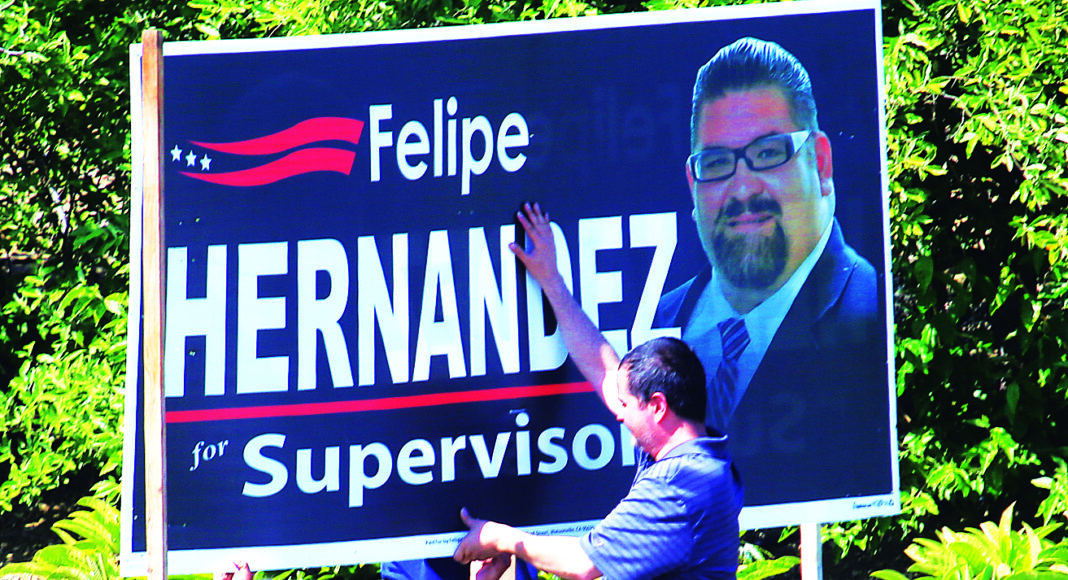With millions of federal, state and local dollars pouring into the Pajaro Valley for various projects—including the renovation of the Pajaro River levee, the purchase of Watsonville Community Hospital and the establishment of the new County of Santa Cruz headquarters at the old West Marine Building—South County is at a key inflection point.
So when 4th District County Supervisor Greg Caput told GT earlier this year that he would not seek a fourth term, the door was left wide open for candidates looking to lead the area through a mini-renaissance.
Enter Felipe Hernandez, who has himself undergone a renewal of sorts. Three years ago, the former Watsonville city councilman and current Cabrillo College Governing Board Trustee weighed 440 pounds and couldn’t walk more than 10 minutes on a treadmill. Now, he’s weighing in at 270 pounds, and starts his day with a rigorous bike or boxing workout. He says the hours spent burning off the weight at his home gym has served him well as he’s walked door-to-door trying to drum up support before the June 7 election.
“It hasn’t been easy,” Hernandez says about losing the weight and keeping it off, “but I feel so much better.”
Hernandez has quickly turned into the front runner in political circles for the 4th District seat thanks to a slew of endorsements from politicians, business owners and community organizers over the past two months. He’s also scored the nod from local democratic groups and the California Democratic Party, as well as several labor unions and councils.
In another community, getting the endorsement of former state legislators Bill Monning and Fred Keeley, and county leaders such as Sheriff Jim Hart and Superintendent of Schools Faris Sabbah, would likely give a candidate a strong lead over their opponents. But in Watsonville, where word of mouth still travels faster than a newsletter and a majority of voters are older residents and retirees, it wouldn’t be smart to call the race just yet.
Playing Politics
Hernandez is running against Jimmy Dutra, a Watsonville city councilman fresh off a stint as mayor, and Ed Acosta, a Santa Cruz County Board of Education Trustee.
This is not the first time Dutra and Hernandez have squared off. The two ran against Caput in 2018; Dutra finished second, and Hernandez was third. It was Dutra’s second time running for supervisor, and he ran on a platform of change, as he is in this election.
Dutra says that only he will truly represent the people of Watsonville, and highlights a key difference between his endorsements and that of Hernandez: the majority of his donors and supporters are individuals from Watsonville. Hernandez outraised Dutra by about $7,000, according to the most recent campaign finance disclosure reports, but many of the former’s donors live outside of Watsonville, and $8,300 worth of his roughly $28,000 in donations came from political committees and unions.
“[Hernandez] is the establishment candidate,” Dutra says. “He will be a puppet. I will not be a puppet. I will be doing what is right for the community, and sometimes that might not be agreeing with groups that have this power right now.”
Measuring Up
Dutra says that Hernandez’s recent decision to flip his stance on the impact of Measure U, an amendment to the Watsonville General Plan approved by voters in 2002 that put restrictions on the city’s growth, is a prime example of his opponent’s inability to think for himself.
Hernandez has largely stayed true to his roots while on the campaign trail this spring, advocating for affordable housing, economic growth, additional funding to address homelessness in South County and transportation equity—he’s the only candidate for the 4th District to endorse the No on Measure D campaign.
But in a surprising turn of events, he recently penned an opinion piece in the Pajaronian in which he backed the Measure U extension. And last week he doubled down on the endorsement of the measure at a press conference with Caput.
This comes after Hernandez in 2013 helped pen the rebuttal to the argument against a failed amendment to Measure U called Measure T. The rebuttal stated that allowing Measure U to stand as is was essentially “doing nothing” and “saying ‘no’ to change” in the face of crippling unemployment.
But Hernandez says he’s changed his mind on Measure U, and now believes that keeping the same growth restrictions from the past 20 years in place through 2040 is a good thing. Hernandez echoed many of Caput’s previous stances in the opinion piece, including the idea of smart growth, something the current supervisor championed as a way to appeal to Watsonville voters that sought to slow the city’s expanding population and low-income housing production when he first took office in 2010.
The change of heart on the issue has made his detractors wonder if he’s simply taking the stance to win over voters that have vehemently supported Caput. But Hernandez says that he truly believes Measure U has been a good thing for Watsonville—city of Watsonville officials have said otherwise—and that he would be a drastically different candidate than both Caput and Dutra.
“You can’t be an island and think that you’re going to get anything, and you can’t kick, yell and scream and think you’re going to get anything from this board,” he says. “You have to work with your colleagues, and sometimes you have to compromise.”













